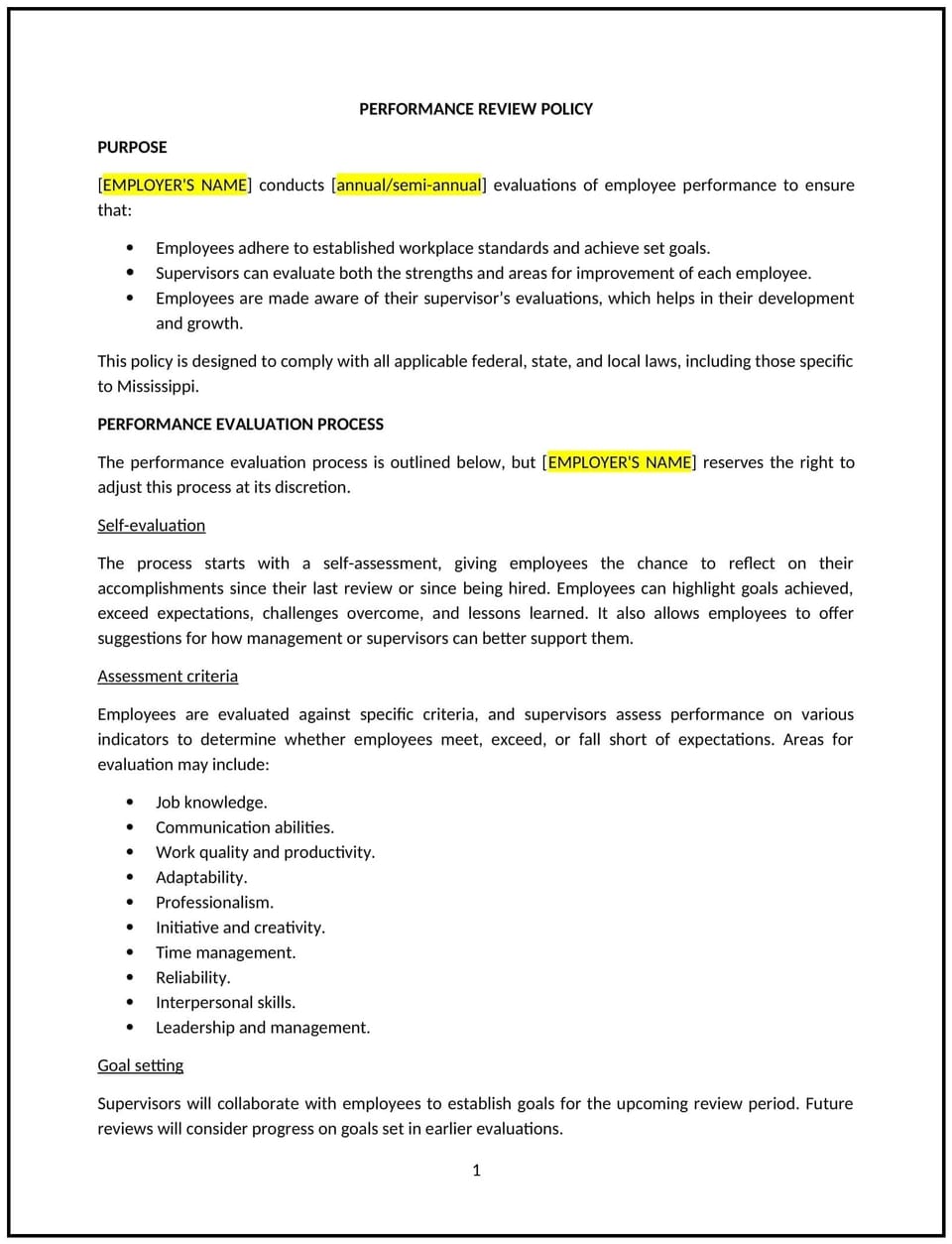Performance review policy (Mississippi): Free template

Performance review policy (Mississippi)
A performance review policy establishes a structured process for evaluating employee performance in Mississippi businesses. This policy helps businesses provide constructive feedback, set performance expectations, and identify opportunities for professional growth. Regular performance reviews also support employee engagement, productivity, and career development while aligning individual goals with business objectives.
By implementing this policy, businesses can ensure a fair and transparent approach to evaluating employee contributions and making informed decisions about promotions, raises, and training needs.
How to use this performance review policy (Mississippi)
- Define review frequency: Specify how often performance reviews occur, such as annually, semi-annually, or quarterly.
- Set evaluation criteria: Establish clear performance metrics, including job responsibilities, goal achievements, teamwork, and professional development.
- Outline review procedures: Describe the process for conducting reviews, including self-assessments, manager evaluations, and peer feedback if applicable.
- Provide feedback structure: Ensure performance reviews include constructive feedback, goal-setting discussions, and recognition of achievements.
- Address performance improvement plans: Establish steps for addressing underperformance, including action plans, coaching, and follow-up assessments.
- Clarify promotion and compensation impact: Define how performance reviews influence salary adjustments, promotions, or additional responsibilities.
- Maintain documentation: Require written records of performance reviews to track progress and support business decisions.
- Train managers on conducting reviews: Provide training to supervisors on how to give effective and unbiased feedback.
- Review and update the policy regularly: Ensure the performance review process remains relevant and beneficial for both employees and the business.
Benefits of using this performance review policy (Mississippi)
This policy offers several benefits for Mississippi businesses:
- Enhances employee development: Provides employees with clear feedback and opportunities for skill improvement.
- Aligns business and employee goals: Helps employees understand how their work contributes to the success of the business.
- Improves workplace communication: Encourages regular discussions between employees and managers about expectations and career progression.
- Supports decision-making: Provides a structured evaluation process for promotions, raises, and performance-based incentives.
- Increases employee motivation: Recognizing achievements and setting career goals can boost employee morale and engagement.
Tips for using this performance review policy (Mississippi)
- Communicate the review process: Employees should understand how and when their performance will be evaluated.
- Provide balanced feedback: Reviews should highlight strengths while addressing areas for improvement in a constructive manner.
- Use consistent evaluation criteria: Standardized criteria help ensure fairness across all performance reviews.
- Encourage two-way communication: Employees should have the opportunity to provide input and discuss career goals.
- Document all reviews: Keeping detailed records helps track progress and supports decisions regarding promotions or corrective actions.
- Train managers on giving feedback: Effective training ensures that managers provide meaningful and unbiased performance evaluations.
Q: Why should Mississippi businesses implement a performance review policy?
A: A structured review process helps businesses provide constructive feedback, assess employee growth, and support career development.
Q: How often should businesses conduct performance reviews?
A: Performance reviews can be conducted annually, semi-annually, or quarterly, depending on business needs and industry standards.
Q: What should be included in a performance review?
A: Reviews should cover job responsibilities, goal achievements, areas for improvement, and future development opportunities.
Q: How can businesses address underperformance?
A: Managers should create a performance improvement plan with specific goals, timelines, and support to help employees improve.
Q: Can performance reviews impact salary and promotions?
A: Yes, businesses may use performance evaluations to determine pay increases, promotions, or additional responsibilities.
Q: How should businesses document performance reviews?
A: All reviews should be recorded in employee files to track progress, provide references for promotions, and support HR decisions.
Q: Should employees be involved in the review process?
A: Yes, self-assessments and open discussions allow employees to participate in setting goals and addressing performance concerns.
Q: How often should this policy be reviewed?
A: Businesses should review the policy annually to ensure it remains effective and aligned with company objectives.
This article contains general legal information and does not contain legal advice. Cobrief is not a law firm or a substitute for an attorney or law firm. The law is complex and changes often. For legal advice, please ask a lawyer.


